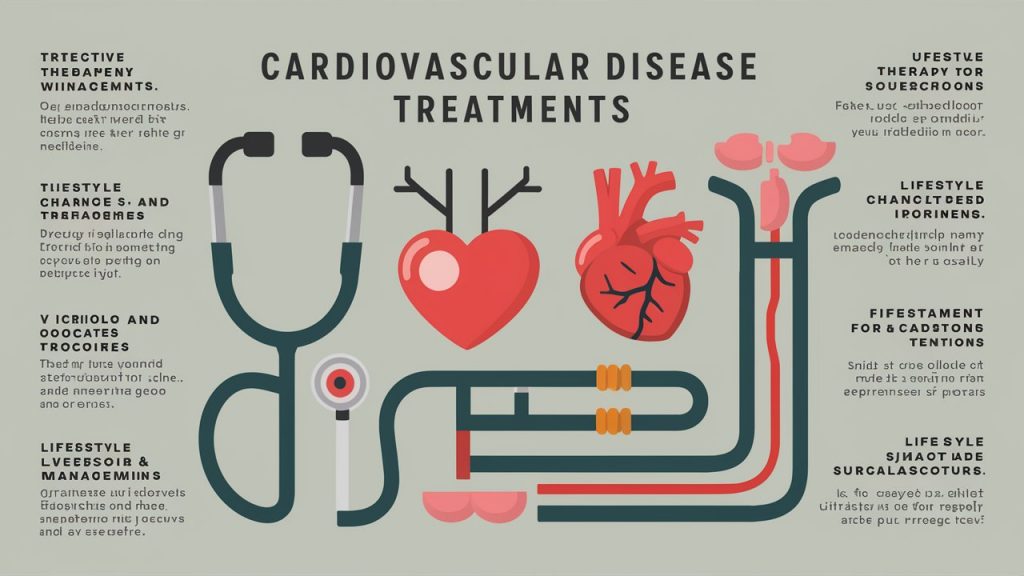Summary of the Article
- Getting to know the different medications for heart disease and their functions.
- Learning about the interventional procedures that are crucial for treating heart conditions.
- Adopting lifestyle changes that are beneficial for the heart to prevent and manage cardiovascular disease.
- Discovering the latest surgical procedures and drugs for heart health.
- Preventative measures to lessen the risk of heart disease.
Heart Health: Effective Treatments & Lifestyle Changes
Your heart is the motor of your body, delivering blood that is vital for life to every cell. It is crucial to keep it in the best condition, and if you have cardiovascular disease, it is critical to know your treatment options. But don’t worry; there are numerous strategies that can help manage, treat, and even prevent heart conditions.
Drugs That Make Your Heart Pump More Effectively
When it comes to treating cardiovascular disease, drugs are usually the first option. These are not a one-stop solution, and it’s crucial to know how they help your heart:
- Statins: Statins are used to reduce cholesterol levels and prevent damage to the arteries.
- Beta-blockers: By slowing the heart rate and lowering blood pressure, beta-blockers reduce the workload on the heart.
- ACE inhibitors: ACE inhibitors help to relax blood vessels and lower blood pressure, making it easier for the heart to pump blood.
- Antiplatelets: Medications such as aspirin, known as antiplatelets, can help to prevent blood clots and reduce the risk of heart attack and stroke.
It’s important to take these medications exactly as directed. They are most effective when used in conjunction with a healthy lifestyle.
Timely Interventional Procedures: Critical Care when it Matters Most
When medication isn’t enough, interventional procedures can be performed to physically unblock arteries or repair any damage. Some of these life-saving treatments include:
- Angioplasty: This procedure involves inserting and inflating a small balloon to widen a constricted artery.
- Stenting: In this procedure, a small wire mesh tube, known as a stent, is inserted after angioplasty to keep the artery open.
- Bypass surgery: In this surgical procedure, doctors create a new route around the blocked artery to enhance blood flow to the heart muscle.
These treatments can be life-changing, significantly enhancing the quality of life and increasing the lifespan of many patients.
Keep Moving: How Exercise Can Keep Your Heart Healthy
Let’s discuss exercise – it’s akin to a heart check-up. Regular physical activity fortifies your heart muscle, enhances circulation, and can assist in reducing your blood pressure and cholesterol levels. Consider it a natural remedy with no side effects, unless you count perspiration. Here’s what you can do:
- Go for a brisk walk every day. Try to aim for at least 30 minutes, but even 10-minute increments are beneficial.
- Sign up for a class or find a workout partner. It’s more enjoyable and you’ll be more motivated to continue.
- Keep in mind, every little bit helps: gardening, dancing, or even playing tag with your children gets your heart rate up.
Don’t be concerned if you’re not a sportsman. The most important thing is to find activities you like and incorporate them into your daily routine.
Heart Health Breakthroughs: New and Exciting Therapies
When it comes to heart health, progress never stops. Scientists and physicians are continuously searching for improved methods of treating heart disease. With the development of new medications and advanced technology, the outlook for those with heart disease is becoming increasingly positive.
Option A.
Groundbreaking Drugs and Their Effects
From a pharmaceutical perspective, there are new types of drugs that are causing a stir. We have drugs that assist in managing cholesterol levels in ways that statins cannot. And for those suffering from heart failure, medications that function at a cellular level to enhance heart function are turning out to be revolutionary.
One medication, Entresto, has been demonstrated to significantly decrease the likelihood of hospitalization and death due to heart failure.
It is crucial to discuss these novel therapies with your healthcare provider to determine if they are suitable for you.
Play it Safe: Keep Your Heart Healthy
When it comes to heart disease, prevention is key. The choices you make now can affect your health for years to come. It’s not just about avoiding unhealthy habits, but also about developing healthy ones.
Keeping an Eye on Your Heart Health: Important Checkups
Regular checkups are your first line of defense. They can catch issues early when they’re most treatable. Here’s what you should be keeping track of: for more information, read about cardiovascular disease risk factors.
- Blood pressure: You should have your blood pressure checked at least once a year. If it’s high, you’ll need to check it more often.
- Cholesterol levels: For adults, these should be checked every 4-6 years, or more often if you have risk factors.
- Blood sugar: High levels can indicate a risk for diabetes, which is a major risk factor for heart disease.
These tests are simple, but they can tell you a lot about the health of your heart.
Identifying Risk Factors: What’s In Your Control and How to Change It
There are certain risk factors for heart disease that you can’t change, such as your age or family history. However, there are many risk factors that you can control. Smoking, unhealthy eating, and a lack of physical activity are all risk factors that you can change. Start by taking small steps, such as reducing your sugar intake and getting up from your desk to move around every hour. Every little bit counts.
When you manage these factors, you’re not only boosting your heart health; you’re also taking the reins of your life. That’s empowering.
How Regularly Should I Get My Heart Screened to Avoid Disease?
Your heart, like your car, needs regular check-ups. Consider your healthcare provider to be your heart’s mechanic. Adults should have a heart health assessment at least once a year, which should include blood pressure, cholesterol, and glucose level checks. If you have risk factors such as a family history of heart disease, high blood pressure, or if you smoke, you may need to visit more often.
Regular pediatric checkups should include assessments of heart health for children. It is never too soon to begin monitoring heart health. These checkups are important because they can identify potential problems before they become major issues.
Don’t forget, taking care of your heart health is a great way to lower your chances of getting heart disease. So, make sure to schedule your yearly physical, and don’t be afraid to see your doctor if something doesn’t feel right in between those appointments.
What Daily Habits Can I Adopt to Reduce My Risk of Heart Disease?
Every day is a chance to make choices that are good for your heart. Here are some things you can do:
- Follow a balanced diet: Include fruits, vegetables, whole grains, lean proteins, and healthy fats in your meals. For more details, see this guide on the Mediterranean diet, a heart-healthy approach.
- Exercise regularly: Try to get at least 150 minutes of moderate-intensity aerobic activity each week.
- Keep a healthy weight: Carrying extra weight can put a strain on your heart, so it’s important to monitor your body mass index (BMI).
- Keep stress under control: Use healthy methods to deal with stress, like meditation, yoga, or deep breathing exercises.
- Get enough sleep: Strive for 7-9 hours of quality sleep each night.
By making these habits part of your everyday life, you’re doing more than just fighting heart disease; you’re setting the stage for a healthier, happier you.
Keep in mind, the small decisions you make daily can result in significant improvements in your heart health. Therefore, make smart choices and act immediately. Your heart will be grateful.
Commonly Asked Questions
What Are the Best Medications for Cardiovascular Disease?
The best medications for cardiovascular disease are the ones that treat your unique condition and risk factors. Cholesterol statins, high blood pressure beta-blockers, and anticoagulants for blood clot prevention are some of the most frequently prescribed. However, it’s important to have a treatment plan tailored to you by your healthcare provider.
Is It True That Changing My Lifestyle Can Better My Heart Health?
Yes, it’s true! Modifying your lifestyle can significantly improve your heart health. By incorporating regular exercise, eating a healthy diet, quitting smoking, and managing stress, you can promote a healthier heart and decrease your risk of developing heart disease. These changes can also improve the effectiveness of any medications or treatments you may currently be undergoing.
What Are the Most Recent Advances in Heart Disease Treatments?
Some of the newest treatments include medications such as PCSK9 inhibitors to lower cholesterol and SGLT2 inhibitors for heart failure. Less invasive procedures, like transcatheter aortic valve replacement (TAVR), are also revolutionizing the way we treat heart disease.
It’s an exciting period in the field of cardiology, with ongoing research constantly pushing the envelope. You should always consult with your doctor about the most recent treatments that might be right for you. For more detailed information on treatment options, visit Coronary Heart Disease – Treatment provided by the National Heart, Lung, and Blood Institute (NHLBI).
Finally, whether you’re managing a current heart condition or trying to avoid one, remember that you have the ability to impact your heart health. A comprehensive approach to heart health includes taking medications, making lifestyle changes, and staying up-to-date on the latest treatments. Start taking control of your heart health today for a healthier tomorrow.
Cardiovascular Disease Treatments: Effective Therapy & Management Options.

